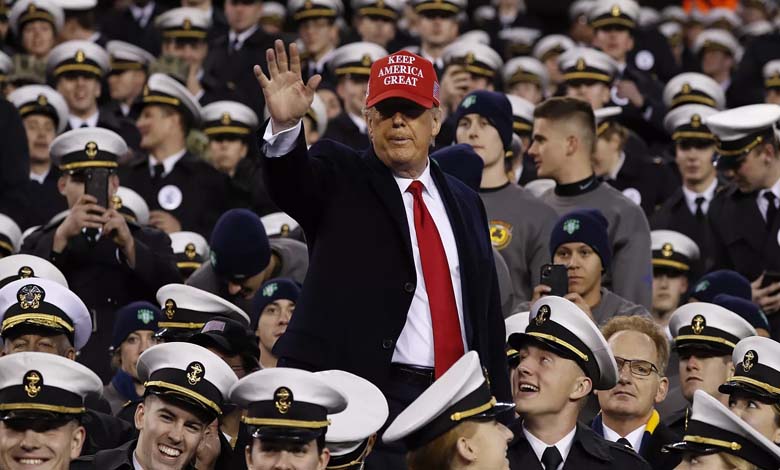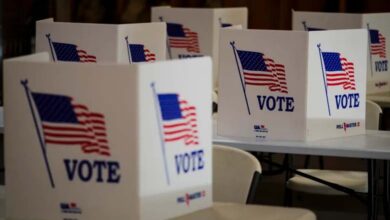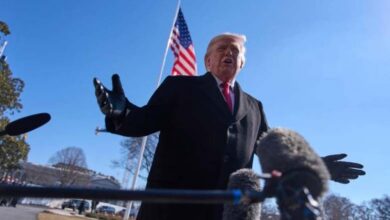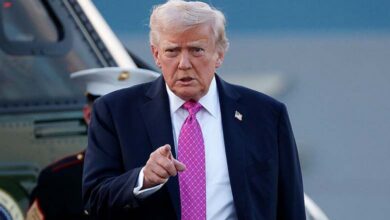Trump and the Insurrection Act: Why Deploying the U.S. Military at Home Deepens Division

President Donald Trump is edging closer to invoking one of the most sensitive laws in U.S. history — the Insurrection Act — in a move considered among the most controversial of his second term.
-
Trump Unveils the Air Sovereignty Triad: A Strategy to Shape the Sky of the Century
-
Trump Hints at Good News on Gaza as Netanyahu Hosts U.S. Security Official
This development coincides with the deployment of U.S. Marines to Los Angeles to support the National Guard amid widespread protests against federal immigration raids. It raises fundamental questions about the limits of presidential authority and the public’s tolerance for coercive federal actions.
While the White House views the measure as a powerful tool to “restore order” and rally political support, it also evokes painful memories — particularly the use of excessive force in Lafayette Square in 2020 against racial justice protesters, as highlighted in a CNN analysis.
-
Make Sure the Door Is Closed… Trump Gives Macron Marriage Advice After Slap Video
-
Trump Celebrates Major Economic Victories in First 100 Days
National Guard Deployment: Force Display or Political Gamble?
CNN reports that around 700 Marines have been deployed to assist the National Guard in Los Angeles in response to demonstrations triggered by workplace raids targeting undocumented immigrants.
Though these troops currently lack policing authority, invoking the Insurrection Act would grant them such powers — marking a serious constitutional shift in federal-state relations.
-
Trump Administration Considered Relocating One Million Palestinians to Libya
-
Trump Shuts Down the Office for Climate Diplomacy: What Are the Global Consequences?
The White House is clearly not viewing this as purely a security issue. Trump’s spokesman, Steven Cheung, boasted on X (formerly Twitter) about polls showing public support for deportation efforts, claiming that backing “will increase further after troops arrive in Los Angeles.”
Yet history suggests that military solutions to domestic unrest often backfire politically.
The Insurrection Act Under Fire
Dating back to 1807, the Insurrection Act allows the president to deploy federal forces domestically if states cannot maintain public order. But its application is highly controversial, as it can clash with the principle of federalism that grants states broad internal security authority.
-
Trump and Foreign Policy: 4 Keys to Understanding the Chaos of the First 100 Days
-
Ukraine Settlement: Trump’s Plan Clashes with Kyiv’s Stubbornness and Moscow’s Missiles
Back in 2020, former Defense Secretary Mark Esper rejected Trump’s proposal to invoke the law to crack down on Black Lives Matter protests, warning against the militarization of domestic affairs and the erosion of public trust in institutions.
Today, the scenario returns in a more polarized context, with immigration, social protests, and electoral dynamics converging — particularly in a politically strategic state like California.
Popular Support for the Idea, Not the Execution
Recent polls show that 54% of Americans support the deportation of undocumented immigrants, but this support doesn’t extend to how the plan is carried out. A CBS News/YouGov survey revealed 56% disapproval of Trump’s execution of deportations, compared to 44% who approved.
-
Wanted for $5 Million: Trump Administration Hunts Down Man Who Sells Death
-
Afrikaners between the Dream of Staying and Trump’s Temptations: A Struggle between Identity and Reality
The independent voter bloc, crucial in U.S. elections, is particularly conflicted: while 65% agree with the goals of the program, they oppose Trump’s methods by a 30-point margin, highlighting how public opinion is sensitive to displays of excessive force, especially if not backed by fair legal procedures.
Political Risks Looming
Americans have not forgotten Lafayette Square. Following that incident, USA Today/Ipsos and CNN/SSRS polls showed majorities opposing military force against domestic protesters, with gaps ranging from 10 to 24 percentage points.
This collective memory may hinder Trump’s ability to rally wide support for any step toward militarizing internal policy — especially if paired with media suppression or targeted actions against immigrant communities.
-
Can Congress Stop Trump’s Tariffs?
-
The Week of Reckoning in America… Trump’s Loyalty Philosophy under Scrutiny
Still, Trump recognizes that immigration is a political flashpoint — one that resonates deeply with the Republican base. While Americans may disagree on methods, many support firm action on illegal immigration.
Yet, if the administration overreaches — through troop deployment or mass arrests without legal justification — it risks backlash. Media or advocacy groups could highlight abuses like the deportation of parents of American children or legally employed workers.
A Pew Research Center poll found that 60% of Americans oppose deporting parents of U.S. citizen children, and 56% oppose deporting workers in stable jobs.
-
A 40-Year-Old Secret… Was Trump a KGB Spy?
-
When the “Riviera” Clashes with Resilience: Trump’s Vision for Gaza Between Benefit and Identity
A Fragile Balance Between Force and the Constitution
Caught between enforcing law and respecting freedoms, Trump walks a tightrope. If he activates the Insurrection Act and deploys military forces domestically, he’s not only addressing protesters and migrants — he’s confronting American historical norms that have long resisted the militarization of internal politics.
According to analysts, the coming weeks will reveal whether this move becomes a security success or a constitutional crisis that undermines public trust in the state.












